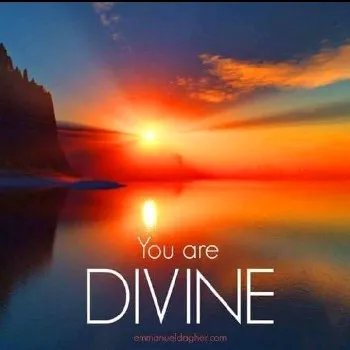Love and Divine
Love is Creativity
The story of Adam and Eve in the Abrahamic traditions, particularly in Christianity and Judaism, is often interpreted as a foundational narrative about love, relationships, and human nature. According to the biblical account in the Book of Genesis, Adam and Eve were the first human beings created by God and were placed in the Garden of Eden.
Their relationship is depicted as one of intimacy, companionship, and mutual dependence. Adam and Eve's love for each other is symbolized by their unity and shared experience in the Garden before the Fall. They were described as "one flesh," highlighting the deep bond between them.
However, their story also illustrates the complexities of love, choice, and consequence. When tempted by the serpent, Eve disobeyed God's commandment not to eat from the Tree of Knowledge, and Adam followed suit. This act of disobedience, known as the Fall, resulted in their expulsion from Eden and introduced sin and suffering into the world.
Despite this tragic turn of events, the story of Adam and Eve is also one of redemption and hope. It underscores the power of love to endure even in the face of hardship and the capacity for humans to seek reconciliation with God and each other.
In various interpretations and retellings, the story of Adam and Eve continues to serve as a metaphor for the complexities of human relationships, the consequences of free will, and the enduring quest for love, forgiveness, and redemption.
In Judaism, love is a central theme that is expressed in various forms throughout religious teachings, rituals, and traditions. One of the key concepts in Judaism is the commandment to love God with all one's heart, soul, and strength (Deuteronomy 6:5). This love for God is seen as the foundation of Jewish faith and devotion, manifesting in acts of prayer, study, and ethical living.
Furthermore, love for fellow human beings is also emphasized in Jewish teachings. The principle of "loving your neighbor as yourself" (Leviticus 19:18) is regarded as one of the fundamental ethical principles in Judaism, promoting compassion, empathy, and social responsibility.
Within the context of romantic relationships, marriage is highly valued in Jewish tradition, seen as a sacred bond established by God. Love and commitment between spouses are considered essential for building a strong and harmonious family life.
Additionally, there are various poetic expressions of love and longing in Jewish scripture, particularly in the Song of Songs, which is interpreted allegorically as a depiction of the love between God and the Jewish people.
Overall, love in Judaism is multifaceted, encompassing love for God, love for others, and love within interpersonal relationships. It is deeply intertwined with ethical values, religious observance, and the quest for spiritual fulfillment.
In Hinduism, there are several deities associated with love, each representing different aspects of this complex emotion. One of the most prominent is Lord Krishna, often depicted as a playful young cowherd who embodies divine love and compassion. Krishna's romantic relationship with Radha, his eternal consort, symbolizes the soul's yearning for union with the divine.
Another significant deity associated with love is Kamadeva, the Hindu god of desire and passion. Kamadeva is often depicted wielding a bow and arrow, representing the power to ignite feelings of love and attraction in the hearts of both humans and gods.
Additionally, the goddess Parvati, particularly in her form as Meenakshi, is revered as a symbol of marital love and devotion. Married couples often seek her blessings for a happy and harmonious relationship.
Furthermore, there are numerous local and regional deities in Hinduism associated with love and fertility, reflecting the diversity of traditions and beliefs within the religion.
Overall, these deities play an essential role in Hindu mythology and worship, guiding devotees in matters of love, relationships, and devotion to the divine.
In Islam, love is a multifaceted concept that encompasses various dimensions of human experience and spirituality. Central to Islamic teachings is the notion of love for Allah (God) and love for one's fellow beings. Love for Allah is considered the highest form of love, and Muslims strive to cultivate a deep, reverent affection for the Creator through acts of devotion, prayer, and obedience to His commandments.
Additionally, Islam emphasizes the importance of love and compassion toward fellow humans, regardless of their backgrounds or beliefs. The Prophet Muhammad (peace be upon him) taught that love for others is a fundamental aspect of faith, and Muslims are encouraged to show kindness, empathy, and generosity toward all people, as exemplified by the concept of "brotherhood" in Islam.
Furthermore, love within familial relationships, friendships, and marriages is highly valued in Islam. The Quran and Hadith (sayings and actions of the Prophet Muhammad) provide guidance on how to nurture and maintain healthy, loving relationships based on mutual respect, understanding, and support.
Overall, love in Islam is seen as a transformative force that fosters spiritual growth, strengthens communities, and brings harmony to the world. It is deeply intertwined with faith, compassion, and righteous conduct, serving as a guiding principle for Muslims in their personal and communal lives.
In many religious and spiritual traditions, God is often associated with love. For example, in Christianity, the Bible famously states that "God is love" (1 John 4:8). This notion suggests that love is not just an attribute of God, but rather an essential aspect of God's nature. Many believers see love as the driving force behind God's actions, including the creation of the universe, the establishment of moral principles, and the redemption of humanity. Love, in this context, is often described as unconditional, sacrificial, and transformative. Across various faiths, the idea of God's love serves as a source of comfort, guidance, and inspiration for believers seeking to understand their purpose and place in the world.
Love and creation are intimately connected. Love often serves as a driving force behind creation, whether it's creating art, relationships, or even entire worlds. When we love something deeply, we're often inspired to express that love through creation, whether it's writing a poem, painting a picture, or building something meaningful. Similarly, creation can be an act of love, imbuing something with care, attention, and intention. Love can fuel creativity and give birth to new ideas, innovations, and expressions of beauty.
The concept of a "creator of love" varies depending on one's beliefs and perspectives. Some might attribute the creation of love to a divine being or higher power, while others view it as an emergent phenomenon arising from the complexity of human emotions and relationships. In religious and spiritual contexts, gods or deities are often credited with creating love as an essential aspect of the human experience. Philosophically, love may be seen as a fundamental force or principle woven into the fabric of existence. Ultimately, the idea of a "creator of love" is deeply subjective and can be interpreted in myriad ways across cultures, beliefs, and worldviews.
The story of Adam and Eve in the Abrahamic traditions, particularly in Christianity and Judaism, is often interpreted as a foundational narrative about love, relationships, and human nature. According to the biblical account in the Book of Genesis, Adam and Eve were the first human beings created by God and were placed in the Garden of Eden.
Their relationship is depicted as one of intimacy, companionship, and mutual dependence. Adam and Eve's love for each other is symbolized by their unity and shared experience in the Garden before the Fall. They were described as "one flesh," highlighting the deep bond between them.
However, their story also illustrates the complexities of love, choice, and consequence. When tempted by the serpent, Eve disobeyed God's commandment not to eat from the Tree of Knowledge, and Adam followed suit. This act of disobedience, known as the Fall, resulted in their expulsion from Eden and introduced sin and suffering into the world.
Despite this tragic turn of events, the story of Adam and Eve is also one of redemption and hope. It underscores the power of love to endure even in the face of hardship and the capacity for humans to seek reconciliation with God and each other.
In various interpretations and retellings, the story of Adam and Eve continues to serve as a metaphor for the complexities of human relationships, the consequences of free will, and the enduring quest for love, forgiveness, and redemption.
In Judaism, love is a central theme that is expressed in various forms throughout religious teachings, rituals, and traditions. One of the key concepts in Judaism is the commandment to love God with all one's heart, soul, and strength (Deuteronomy 6:5). This love for God is seen as the foundation of Jewish faith and devotion, manifesting in acts of prayer, study, and ethical living.
Furthermore, love for fellow human beings is also emphasized in Jewish teachings. The principle of "loving your neighbor as yourself" (Leviticus 19:18) is regarded as one of the fundamental ethical principles in Judaism, promoting compassion, empathy, and social responsibility.
Within the context of romantic relationships, marriage is highly valued in Jewish tradition, seen as a sacred bond established by God. Love and commitment between spouses are considered essential for building a strong and harmonious family life.
Additionally, there are various poetic expressions of love and longing in Jewish scripture, particularly in the Song of Songs, which is interpreted allegorically as a depiction of the love between God and the Jewish people.
Overall, love in Judaism is multifaceted, encompassing love for God, love for others, and love within interpersonal relationships. It is deeply intertwined with ethical values, religious observance, and the quest for spiritual fulfillment.
In Hinduism, there are several deities associated with love, each representing different aspects of this complex emotion. One of the most prominent is Lord Krishna, often depicted as a playful young cowherd who embodies divine love and compassion. Krishna's romantic relationship with Radha, his eternal consort, symbolizes the soul's yearning for union with the divine.
Another significant deity associated with love is Kamadeva, the Hindu god of desire and passion. Kamadeva is often depicted wielding a bow and arrow, representing the power to ignite feelings of love and attraction in the hearts of both humans and gods.
Additionally, the goddess Parvati, particularly in her form as Meenakshi, is revered as a symbol of marital love and devotion. Married couples often seek her blessings for a happy and harmonious relationship.
Furthermore, there are numerous local and regional deities in Hinduism associated with love and fertility, reflecting the diversity of traditions and beliefs within the religion.
Overall, these deities play an essential role in Hindu mythology and worship, guiding devotees in matters of love, relationships, and devotion to the divine.
In Islam, love is a multifaceted concept that encompasses various dimensions of human experience and spirituality. Central to Islamic teachings is the notion of love for Allah (God) and love for one's fellow beings. Love for Allah is considered the highest form of love, and Muslims strive to cultivate a deep, reverent affection for the Creator through acts of devotion, prayer, and obedience to His commandments.
Additionally, Islam emphasizes the importance of love and compassion toward fellow humans, regardless of their backgrounds or beliefs. The Prophet Muhammad (peace be upon him) taught that love for others is a fundamental aspect of faith, and Muslims are encouraged to show kindness, empathy, and generosity toward all people, as exemplified by the concept of "brotherhood" in Islam.
Furthermore, love within familial relationships, friendships, and marriages is highly valued in Islam. The Quran and Hadith (sayings and actions of the Prophet Muhammad) provide guidance on how to nurture and maintain healthy, loving relationships based on mutual respect, understanding, and support.
Overall, love in Islam is seen as a transformative force that fosters spiritual growth, strengthens communities, and brings harmony to the world. It is deeply intertwined with faith, compassion, and righteous conduct, serving as a guiding principle for Muslims in their personal and communal lives.
In many religious and spiritual traditions, God is often associated with love. For example, in Christianity, the Bible famously states that "God is love" (1 John 4:8). This notion suggests that love is not just an attribute of God, but rather an essential aspect of God's nature. Many believers see love as the driving force behind God's actions, including the creation of the universe, the establishment of moral principles, and the redemption of humanity. Love, in this context, is often described as unconditional, sacrificial, and transformative. Across various faiths, the idea of God's love serves as a source of comfort, guidance, and inspiration for believers seeking to understand their purpose and place in the world.
Love and creation are intimately connected. Love often serves as a driving force behind creation, whether it's creating art, relationships, or even entire worlds. When we love something deeply, we're often inspired to express that love through creation, whether it's writing a poem, painting a picture, or building something meaningful. Similarly, creation can be an act of love, imbuing something with care, attention, and intention. Love can fuel creativity and give birth to new ideas, innovations, and expressions of beauty.
The concept of a "creator of love" varies depending on one's beliefs and perspectives. Some might attribute the creation of love to a divine being or higher power, while others view it as an emergent phenomenon arising from the complexity of human emotions and relationships. In religious and spiritual contexts, gods or deities are often credited with creating love as an essential aspect of the human experience. Philosophically, love may be seen as a fundamental force or principle woven into the fabric of existence. Ultimately, the idea of a "creator of love" is deeply subjective and can be interpreted in myriad ways across cultures, beliefs, and worldviews.
Related Stories











